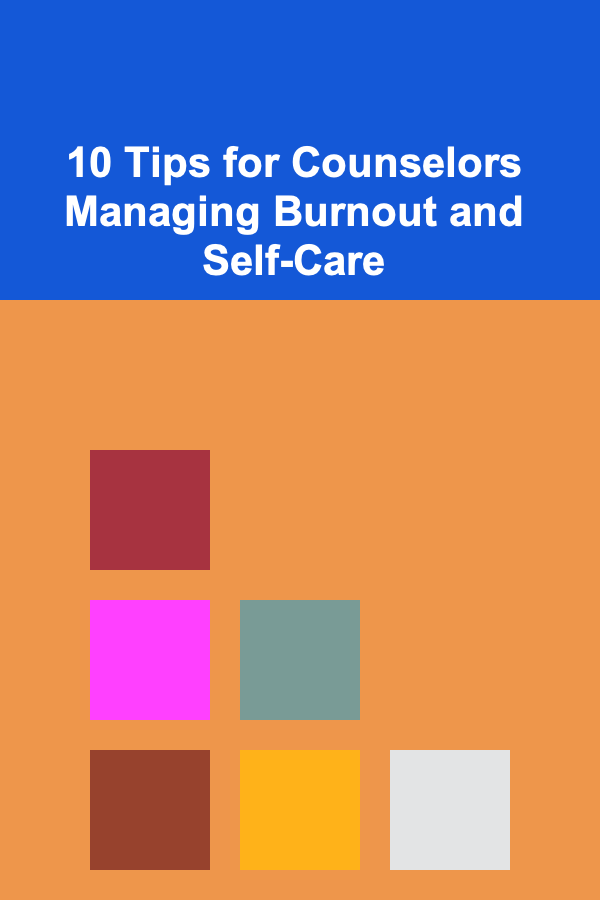
10 Tips for Counselors Managing Burnout and Self-Care
ebook include PDF & Audio bundle (Micro Guide)
$12.99$9.99
Limited Time Offer! Order within the next:

Counseling is a deeply rewarding profession that provides an opportunity to help individuals overcome personal challenges, heal from trauma, and improve their overall well-being. However, the emotional and mental toll of working with clients in distress can be immense. Over time, counselors may experience burnout, a state of physical, emotional, and mental exhaustion caused by prolonged stress and emotional strain. This can impact their ability to effectively serve their clients, and in some cases, lead to feelings of frustration, hopelessness, and detachment.
Burnout is an all-too-common issue for mental health professionals, and it is crucial for counselors to take steps to manage their own well-being. In a profession dedicated to helping others, it is often easy to forget the importance of caring for oneself. However, maintaining a healthy work-life balance, setting boundaries, and regularly engaging in self-care practices are essential for sustaining long-term success and mental health in this demanding field.
In this article, we will explore ten practical tips for counselors to manage burnout and prioritize self-care. These strategies are designed to help counselors maintain their emotional resilience, improve their work-life balance, and prevent burnout from negatively affecting their careers and personal lives.
Recognize the Signs of Burnout
The first step in managing burnout is to acknowledge its existence. Many counselors continue to push through feelings of exhaustion, stress, and emotional fatigue without realizing the toll it is taking on their mental and physical health. It is important to be aware of the common signs of burnout, which include:
- Emotional exhaustion: Feeling drained, fatigued, or overwhelmed by the demands of the job.
- Depersonalization: Developing a sense of detachment from clients or colleagues, which can lead to a decrease in empathy and compassion.
- Reduced personal accomplishment: Feeling ineffective or incompetent in helping clients, and doubting one's ability to make a positive impact.
- Physical symptoms: Experiencing headaches, sleep disturbances, digestive issues, or frequent illness as a result of stress.
By recognizing the early warning signs of burnout, counselors can take proactive steps to address the issue before it becomes more severe.
Set Clear Boundaries with Clients
Boundaries are essential for maintaining a healthy counselor-client relationship and preventing burnout. While it is important to empathize with clients and provide support, counselors must also establish limits to ensure that they do not become overwhelmed by the emotional demands of their work.
Strategies for Setting Boundaries:
- Limit the scope of availability: Establish clear hours of availability and stick to them. Avoid answering emails or phone calls outside of work hours to create a sense of separation between professional and personal life.
- Be mindful of emotional boundaries: Counselors should avoid becoming overly involved in their clients' personal lives. It is important to maintain a professional distance while still offering empathy and support.
- Practice self-disclosure judiciously: While it is important to build rapport with clients, counselors should be careful not to overshare personal information, as this can blur the lines between therapist and client.
By setting clear boundaries, counselors can protect their own emotional health while providing the necessary support for their clients.
Engage in Regular Supervision and Peer Support
Counselors often carry the emotional weight of their clients' struggles, and this can take a toll on their own mental well-being. Regular supervision and peer support are essential components of self-care for counselors. Supervision provides a safe space for counselors to discuss their feelings, challenges, and emotional responses to client work. Peer support groups offer a sense of community and shared understanding, where counselors can exchange experiences and advice.
Benefits of Supervision and Peer Support:
- Emotional processing: Supervision allows counselors to process difficult or emotionally charged cases in a supportive environment, helping them manage feelings of burnout or distress.
- Skill development: Peer support provides opportunities for professional growth and development through the sharing of new techniques, approaches, and perspectives.
- Validation and reassurance: Talking with colleagues who understand the challenges of counseling can help counselors feel validated and reassured in their work.
By engaging in regular supervision and seeking out peer support, counselors can maintain their emotional resilience and continue providing high-quality care for their clients.
Practice Mindfulness and Meditation
Mindfulness and meditation are powerful tools that can help counselors reduce stress, stay present in their work, and improve emotional well-being. These practices encourage counselors to focus on the present moment and cultivate a sense of calm and awareness. Regular mindfulness and meditation can improve concentration, reduce anxiety, and promote emotional balance.
Ways to Incorporate Mindfulness:
- Mindful breathing: Take short breaks throughout the day to practice deep breathing exercises. Focus on your breath as you inhale and exhale, allowing your mind to clear and your body to relax.
- Guided meditation: Use apps or videos for guided meditation sessions to help calm the mind and reduce stress. These sessions can be short and easy to incorporate into a busy schedule.
- Body scan exercises: Engage in body scan exercises to check in with your physical sensations and release tension in areas where you may be holding stress.
By incorporating mindfulness and meditation into their daily routine, counselors can promote emotional resilience and reduce the risk of burnout.
Maintain a Healthy Work-Life Balance
A healthy work-life balance is crucial for preventing burnout. Counselors often find it difficult to separate their professional lives from their personal lives, especially when they are deeply committed to their clients. However, it is important to prioritize personal time and engage in activities that bring joy and relaxation.
Tips for Achieving Work-Life Balance:
- Schedule downtime: Set aside time each day or week for relaxation and activities that help you recharge, such as reading, exercise, or spending time with loved ones.
- Take regular breaks: During work hours, make sure to take breaks between sessions to step away from your work and reset mentally and emotionally.
- Plan vacations or staycations: Make time for extended breaks from work, whether through a vacation or simply taking time off to rest and recharge.
By maintaining a healthy balance between work and personal life, counselors can ensure they have the energy and mental clarity to provide effective support for their clients.
Engage in Physical Activity
Physical activity is a powerful way to reduce stress, improve mood, and enhance overall well-being. Regular exercise releases endorphins, which are natural mood-boosters that can help counteract the emotional exhaustion associated with burnout. Whether it's a brisk walk, yoga, or a more intense workout, physical activity can provide a much-needed break from the emotional demands of counseling work.
Benefits of Physical Activity:
- Stress reduction: Exercise helps to reduce the physical symptoms of stress, such as muscle tension and elevated heart rate.
- Improved mood: Regular exercise can help improve mood and increase feelings of well-being.
- Enhanced energy levels: Engaging in physical activity can boost energy levels and help counselors feel more alert and focused throughout the day.
By incorporating physical activity into their routine, counselors can improve their physical health and better manage the emotional challenges of their work.
Practice Self-Compassion
Counselors are often highly self-critical, holding themselves to high standards of professionalism and empathy. However, it is essential to practice self-compassion and allow yourself to acknowledge that you are human. This means recognizing that it is okay to have limitations and that it's normal to feel overwhelmed or exhausted at times.
Ways to Practice Self-Compassion:
- Be kind to yourself: When you experience difficult emotions or setbacks, treat yourself with the same kindness and understanding that you would offer to a friend or client.
- Acknowledge your feelings: Rather than pushing aside negative emotions, allow yourself to feel and process them. This can help you release stress and prevent emotional buildup.
- Celebrate successes: Take time to acknowledge your accomplishments, no matter how small. Recognizing your successes can boost self-esteem and reinforce your sense of purpose in your work.
By practicing self-compassion, counselors can reduce feelings of guilt or shame and cultivate a more balanced and nurturing relationship with themselves.
Limit Emotional Contagion
Counselors are empathetic by nature, and it is natural to become emotionally connected to clients. However, it is important to be mindful of emotional contagion---the phenomenon where you absorb and mirror the emotions of others. Constant exposure to clients' distress can leave counselors feeling emotionally drained and vulnerable to burnout.
Strategies to Manage Emotional Contagion:
- Emotional detachment: Practice emotional detachment by recognizing that while you can empathize with clients, their feelings are not your own. Remind yourself that you are there to provide support, not to carry their burdens.
- Post-session reflection: After each session, take a moment to reflect on your own emotional state and release any lingering emotions. This can help you separate your clients' emotions from your own.
- Engage in self-care rituals: Incorporate self-care activities after each session to help you decompress and restore emotional balance.
By managing emotional contagion, counselors can protect their own emotional health and avoid burnout.
Seek Professional Help When Needed
Counselors, like anyone else, may experience periods of emotional difficulty or mental health challenges. If feelings of burnout, stress, or anxiety persist, it is important to seek professional help. Talking to a therapist or counselor can provide a safe space to process emotions and gain support.
Reasons to Seek Professional Help:
- Emotional overload: If the emotional demands of the job become overwhelming, seeking therapy can help you process your emotions in a healthy way.
- Burnout prevention: A therapist can help you develop coping strategies to manage stress and prevent burnout.
- Personal growth: Therapy can also be an opportunity for personal growth, helping you gain new insights and develop resilience.
Seeking professional help is not a sign of weakness; it is an important step in ensuring that counselors remain emotionally healthy and capable of providing quality care to their clients.
Foster Meaningful Connections Outside of Work
Finally, it is essential for counselors to nurture relationships and connections outside of their work environment. Engaging in social activities and building strong personal relationships can provide a sense of community, emotional support, and balance.
Ways to Foster Meaningful Connections:
- Spend time with family and friends: Prioritize time spent with loved ones who offer emotional support and encouragement.
- Engage in hobbies: Participate in hobbies or activities that bring joy and allow you to disconnect from work.
- Volunteer or connect with others: Find ways to engage in community activities or volunteer work that align with your values and interests.
By fostering meaningful connections outside of work, counselors can create a strong support system that helps them manage stress and prevent burnout.
In conclusion, burnout is a significant concern for counselors, but by adopting self-care practices and managing emotional health, it is possible to maintain a sustainable and fulfilling career. By recognizing the signs of burnout, setting boundaries, engaging in regular supervision, and prioritizing self-care, counselors can ensure they are able to provide high-quality care to their clients while protecting their own well-being.
Reading More From Our Other Websites
- [Home Rental Property 101] How to Deal with Property Taxes and Fees for Rental Properties
- [Personal Care Tips 101] How to Choose a Toner for Oily Skin
- [Home Storage Solution 101] How to Store Fitness Equipment in a Small Home Gym
- [Home Space Saving 101] How to Save Space in a Shared Room for Multiple Uses
- [Personal Investment 101] How to Stay Emotionally Disciplined While Investing
- [Metal Stamping Tip 101] Top 10 Essential Design Rules for Perfect Metal Stamping Every Time
- [Home Security 101] How to Use Motion-Sensing Lights to Enhance Your Home Security
- [Home Lighting 101] How to Use Lighting to Make Your Home Feel Bigger
- [Organization Tip 101] What Tools Do You Need for Effective Home Organization?
- [Personal Finance Management 101] How to Track Your Spending Effectively

How to Create Memorable Party Favors for Your Home Guests
Read More
How to Create Photography Courses for Aspiring Travel Photographers
Read More
How to Organize Your Home Based on Feng Shui Principles
Read More
How to Set Goals for Document Organization Projects
Read More
The Human Resources Assistant's Guide: Mastering the Essentials of HR Support and Administration
Read More
How to Create a Weekly Productivity Checklist for Freelancers
Read MoreOther Products

How to Create Memorable Party Favors for Your Home Guests
Read More
How to Create Photography Courses for Aspiring Travel Photographers
Read More
How to Organize Your Home Based on Feng Shui Principles
Read More
How to Set Goals for Document Organization Projects
Read More
The Human Resources Assistant's Guide: Mastering the Essentials of HR Support and Administration
Read More